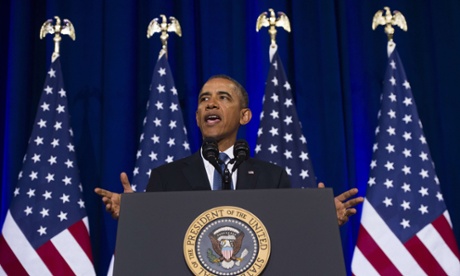White House seeks legal immunity for firms that hand over customer data

Obama administration asks legislators drafting NSA reforms to protect telecoms firms for complying with court orders, Guardian learns
The White House has asked legislators crafting competing reforms of the National Security Agency to provide legal immunity for telecommunications firms that provide the government with customer data, the Guardian has learned.
In a statement of principles privately delivered to lawmakers some weeks ago to guide surveillance reforms, the White House said it wanted legislation protecting “any person who complies in good faith with an order to produce records” from legal liability for complying with court orders for phone records to the government once the NSA no longer collects the data in bulk.
The brief request, contained in a four-page document, echoes a highly controversial provision of the 2008 Fisa Amendments Act, which provided retroactive immunity to the telecommunications companies that allowed the NSA to access calls and call data between Americans and foreigners, voiding lawsuits against them. Barack Obama’s vote for that bill as a senator and presidential candidate disappointed many supporters.
A congressional aide said the telecommunications companies were expected to “fight hard” for the provision to survive in any surveillance bill. Those firms, including Verizon and AT&T, have typically kept far more silent in public about NSA surveillance and their role in it than internet giants, like Yahoo and Google, which have pushed for reforms.
Unlike in 2008, the firms are not facing a spate of lawsuits, although Verizon was named as a defendant in Larry Klayman’s suit against the Obama administration challenging the constitutionality of bulk phone metadata collection.
A senior administration official noted that the provision is typical for surveillance law, to protect companies who comply with Fisa court orders for customer data.
“This would refer to any new orders issued by the court under the new regime we are proposing. This is similar to the way the rest of Fisa already operates, and Fisa already contains virtually identical language for its other provisions, including Section 215,” the official said, referring to the portion of the Patriot Act cited as justification for bulk phone data collection.
The telecommunications immunity is already contained within a bill authored by the House intelligence committee leadership, key legislative allies of the NSA.
But another aspect of the White House document points to an obstacle that congressional sources said is holding up the House intelligence bill – something its opponents consider an opportunity.
That bill, sponsored by Republican chairman Mike Rogers of Michigan and ranking Democrat Dutch Ruppersberger of Maryland, would permit the government to access phone records without specific prior approval by a judge. Ruppersberger said while unveiling the bill in late March that they were “very, very close” to a deal with the White House, though the principles document favors prior court orders.
“Absent an emergency situation, the government would obtain the records only pursuant to individual orders from the Foreign intelligence surveillance court approving the use of specific numbers for such queries, if a judge agrees based on national security concerns,” it reads.
Several congressional aides said that the discrepancy between the White House and the intelligence committee on the issue had stalled the momentum of a bill backed by the House leadership over a rival effort in the judiciary committee – also stalled – that would go far further in reining in bulk data collection.
Ruppersberger said he was in a “constructive dialogue” with stakeholders on his surveillance bill, and expressed confidence in its prospects.
“The chairman and I continue to engage in a constructive dialogue with the administration, members of our respective caucuses in the House and Senate, privacy groups, and technology and telecommunication companies. The issue of increasing transparency while maintaining an important capability to protect our country is extremely important and we will continue to work together in the best way forward,” Ruppersberger said in a statement to the Guardian.
Rogers and Ruppersberger’s legislative rival is a bill sponsored in the House by Republican Jim Sensenbrenner of Wisconsin, a member of the judiciary committee. Known as the USA Freedom Act, it has been bottled up in the committee since its introduction six months ago, owing to the uncertain support of chairman Bob Goodlatte, a Virginia Republican.
The White House surveillance principles document poses its own complications for Ruppersberger’s bill. While that bill requires prior judicial approval for government acquisition of phone records, the White House principles are agnostic about the bulk collection of any other data, which the USA Freedom Act would prevent for Americans.
Jockeying is said to have intensified recently within the judiciary committee to reach a breakthrough on the USA Freedom Act, fueled in part by institutional incentives created by the introduction of Rogers and Ruppersberger’s bill.
The House intelligence committee leaders attempted unsuccessfully to circumvent the judiciary committee through a parliamentary procedure. But since the bill would amend a major surveillance law, it received a secondary referral to the judiciary committee, a hotbed of hostility to it. Opponents are using the circumvention attempt to galvanize Goodlatte into finalizing a modified version of the USA Freedom Act, possibly under a new name. Privacy activists have been pressuring Goodlatte in Virginia to pass the bill.
Goodlatte “doesn’t love everything in USA Freedom, but he’s not the type to get rolled on his jurisdiction,” a congressional staffer explained.
The upcoming legislative calendar also adds a potential element of uncertainty to congressional surveillance maneuvers.
Representative Justin Amash, a Michigan Republican and USA Freedom Act supporter, is warning that he may attach an amendment to defund domestic bulk collection to critical legislation, to include the annual defense authorization bill, known as the NDAA. An earlier version of that amendment, last summer, came surprisingly close to passing, giving the Obama administration a near-death experience on surveillance.
NSA supporters are also rumored to be considering adding their own amendments to the NDAA in order to check privacy advocates. The House leadership wants the NDAA to go for a floor vote the week of May 19. But both civil libertarians and NSA defenders are concerned that amending unrelated bills could introduce rancor and volatility to an already arduous process of surveillance reform.
“If leadership on both sides decide that they want to push through pseudo-reforms through the NDAA or through another piece of legislation, than we’re certainly prepared to offer an amendment like we offered before to any piece of legislation that requires it,” Amash told the Guardian.
“We have to keep all options on the table, and my goal is to protect the American people and do it as soon as possible. We can’t keep waiting. At the same time, I’m willing to sit down and talk with leadership and others, and if I feel that they are moving in the right direction, then certainly, we’re happy to work with them on more comprehensive legislation, like the USA Freedom Act.”
(By Spencer Ackerman)
Source: theguardian





























